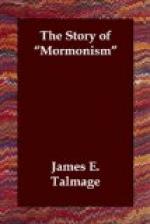In the dread alternative offered them, the people determined again to abandon their homes; but whither should they go? Already they had fled before the lawless oppressor over well nigh half a continent; already were they on the frontiers of the country that they had regarded as the land of promised liberty. Thus far every move had carried them westward, but farther west they could not go unless they went entirely beyond the country of their birth, and gave up their hope of protection under the Constitution, which to them had ever been an inspired instrument, the majesty of which, as they had never doubted, would be some day vindicated, even to securing for them the rights of American citizens. This time their faces were turned toward the east; and a host numbering from ten to twelve thousand, including many women and children, abandoned their homes and fled before their murderous pursuers, reddening the snow with bloody footprints as they journeyed. They crossed the Mississippi and sought protection on the soil of Illinois. There their sad condition evoked for a time general commiseration.
The press of the state denounced the treatment of the people by the Missourians and vindicated the character of the “Mormons” as peaceable and law-abiding citizens. College professors published expressions of their horror over the cruel crusade; state officials, including even the governor, gave substantial evidence of their sympathy and good feeling. This lull in the storm of outrage that had so long raged about them offered a strange contrast to their usual treatment. Let it not be thought that all the people of Illinois were their friends; from the first, opposition was manifest, but their condition was so greatly bettered that they might have thought the advent of their Zion to be near at hand.
I stated that professional men, and even college professors raised their voices in commiseration of the “Mormon” situation and in denouncing the “Mormon” oppressors. Prof. Turner of Illinois College wrote:




